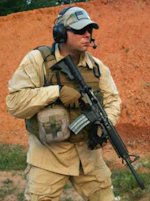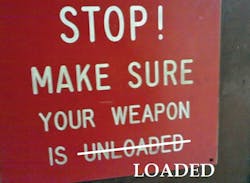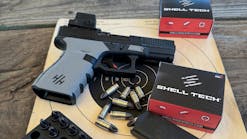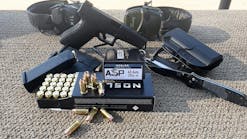Negligent Discharges: Preventable or Inevitable?
More than twenty years ago I recall one of my firearms instructors saying, “There are two kinds of shooters, those who’ve had an ND and those who will.” At the time some of the other students scoffed and made comments about it not ever happening to them or only ‘untrained’ people having them. From a completely statistical standpoint you cannot deny that the more you handle firearms the greater the likelihood that one will go ‘bang’ when you didn’t want it to. That’s not an excuse to handle firearms recklessly. It’s simply a statistical probability.
It is also true that familiarity breeds contempt. The more that people handle firearms the more comfortable they become even to the point of being blasé about how where they are pointed and handled.
If we really start to split atoms you could legitimately say that Negligent Discharges can take the form of either simple negligence or reckless and gross negligence. In the span of less than five days two of my acquaintances have had negligent discharges. One resulted in the death of another person and the other simply ended up with a round in the berm down range.
Post-Incident Considerations
After a negligent discharge occurs the worst thing we can do is simply say “Sh*t happens” and move on. That kind of attitude is in itself negligent. Just as the Federal Aviation Administration investigates airplane crashes to determine the cause and try to prevent that cause in the future, so must we as responsible trainers and professional gun carriers coldly examine what led up to the ND in question. Cops don’t refer to automobile collisions as “accidents” we call them “crashes” because rarely was it a true accident; 99 times out of 100 something could have been done to prevent the crash.
If the ND did not result in an injury the event is typically handled with departmental discipline and, of course, ribbing from one’s peers. The responsible shooter is embarrassed like never before. It’s only after an injury that serious post-shooting investigation takes place. Any time a gun goes ‘bang’ when it wasn’t supposes to we should seriously examine the situation while being quietly relieved if someone wasn’t injured. Calling the guy a “dumb ass” or similar derogatory term doesn’t prevent it from happening again.
Practicing to Fail?
As professional trainers and firearms carriers we need to consider whether our training and ingrained gun handling habits have led to or are likely to lead to a negligent discharge. While it is true that there have been ND’s when the person had a gun in hand and was preparing to fire, but hadn’t yet made the decision, the majority of ND’s occur during “administrative” gun handling.
Think about it. Do shooters have negligent discharges when they have a gun in hand and are planning to shoot? The answer is; most likely not. ND’s most often occur during the loading and unloading or ‘non-fighting’ related tasks. If you are willing to accept the premise that the majority of unintentional discharges occur when people are simply “handling” the gun then you must ask yourself, how often do you want them to handle it?
Institutionalized gun handling practices that require shooters to constantly load, then unload, and load their firearms, often multiple times in one day statistically force the chances of a negligent discharge.
Consider the pistol. Unless the gun is somehow mechanically defective it cannot go off when carried in a designated holster. However, there are agencies, departments, and organizations that force shooters to remove safely carried, loaded pistols from the holster and ‘handle’ them to clear or unload them for benign reasons, such as entering a building. No I’m not talking about jails or prisons. Save your letters.
I’ve witnessed training programs that required shooters to show clear, then load, then unload, then load again multiple times in one single live-fire training evolution. Officers who are trusted to carry a loaded firearm on duty day in and day out are forced by regulation to handle their guns in a non-fighting manner to “clear” them before entering this building or that. (STOP: I know you don’t want loaded guns inside most classrooms. Quit looking for excuses and stick with me.)
The absolute worst violators are the “Weapon Condition Codes” people or other institutional military nonsense. Condition 1 designates a chambered round, Condition 3 an empty chamber but loaded magazine; Condition 4 is for an unloaded firearm. (Condition 2 dealt with firearm that had a half-cock option). When you start forcing shooters to vary the condition code their gun is in you truly set them up for failure.
You cannot trick the mind into thinking something that is not. If men are forced to carry unloaded or half-loaded guns they will treat them that way. Loaded guns are the safest because people treat and handle them with respect.
While on paper Condition Codes seem reasonable and a logical way to ensure “extra” gun safety, what happens in the real world is you have troops who have no idea from day to day, minute to minute what condition their gun is in. Condition 3 trains shooters to treat guns like they are extra safe. Therefore they don’t need to be as conscientious as they would with a truly loaded firearm. I’ve seen shooter after shooter draw a pistol and attempt to fire only to get a ‘click’ because they forgot to chamber a round. On the other end of the spectrum, a pistol was fired into the ground two feet from my head (I was seated and the shooter standing) because the shooter thought the chamber was empty.
Parting Thoughts
If a person is untrained and demonstrably unsafe or reckless with a firearm, don’t give them one. Not every person on planet Earth can or should be a gun carrier and that’s okay. However, if your shooters are in fact trained and trusted to go out amongst the public with loaded firearms stop forcing them to handle their guns when there really is no need to do so.
Forcing cops and other gun carriers to perform some kind of kabuki dance where they are constantly handling their guns in a non-shooting fashion is setting them up for failure. We are either armed and prepared to face deadly threats or we are not. Antiquated Weapon Codes and the Clearing Barrel Mentality will eventually lead to mistakes and sometimes tragedy.
Web Links:
About The Author:
Mr. Markel is a former United States Marine, Police Officer, and has worked as a professional bodyguard both in the U.S. and overseas. A Subject Matter Expert on Small Arms and Tactics, Markel has provided instruction to law enforcement and U.S. Military troops.
As a recognized author and writer, Paul has penned several hundred articles published in numerous professional journals and trade periodicals. Topics include firearms training, use of force, marksmanship, less-than-lethal force options, product reviews and evaluations, emergency medical care, and much more. Sought after as a public speaker, Mr. Markel is at home in front of an audience large or small.

Paul Markel
Mr. Markel is a former United States Marine, Police Officer, and has worked as a professional bodyguard both in the U.S. and overseas. A Subject Matter Expert on Small Arms and Tactics, Markel has provided instruction to law enforcement and U.S. Military troops.
As a recognized author and writer, Paul has penned several hundred articles published in numerous professional journals and trade periodicals. Topics include firearms training, use of force, marksmanship, less-than-lethal force options, product reviews and evaluations, emergency medical care, and much more. Sought after as a public speaker, Mr. Markel is at home in front of an audience large or small.
Follow Mr. Markel's instructional show: http://www.studentofthegun.com



